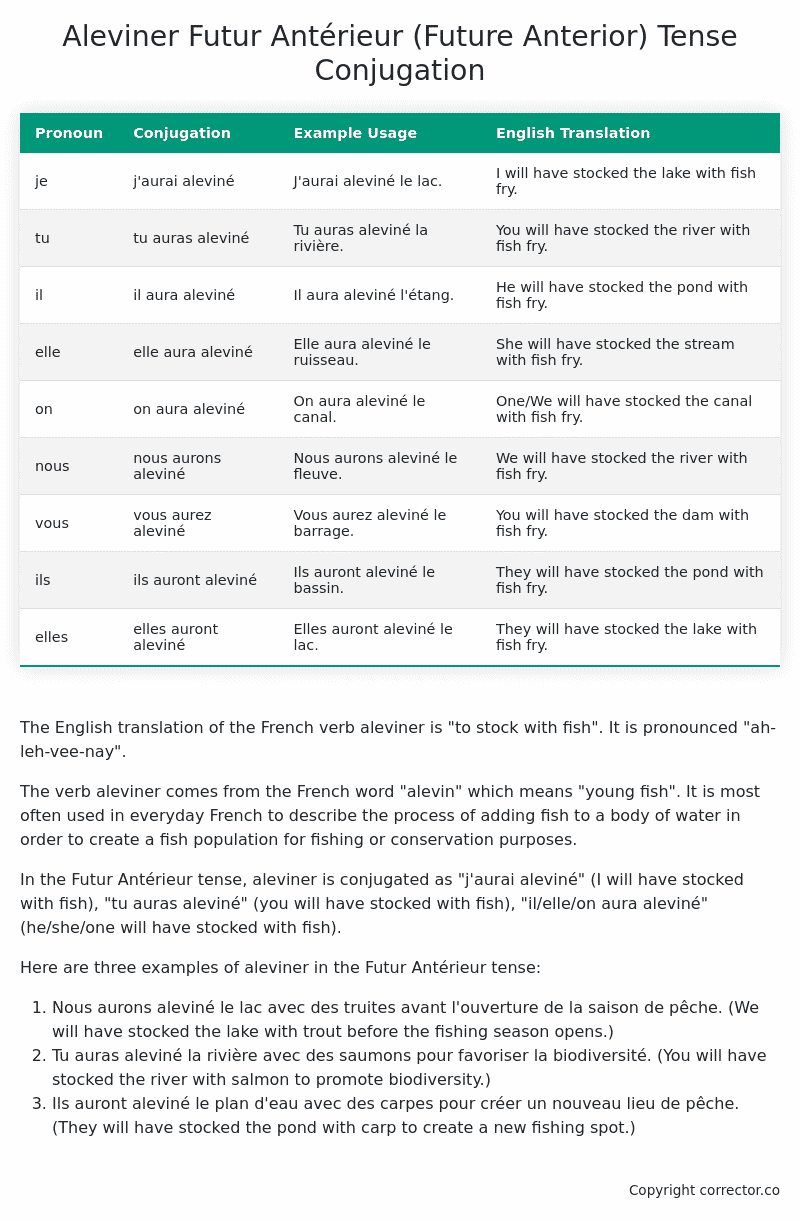Futur Antérieur (Future Anterior) Tense Conjugation of the French Verb aleviner
Introduction to the verb aleviner
The English translation of the French verb aleviner is “to stock with fish”. It is pronounced “ah-leh-vee-nay”.
The verb aleviner comes from the French word “alevin” which means “young fish”. It is most often used in everyday French to describe the process of adding fish to a body of water in order to create a fish population for fishing or conservation purposes.
In the Futur Antérieur tense, aleviner is conjugated as “j’aurai aleviné” (I will have stocked with fish), “tu auras aleviné” (you will have stocked with fish), “il/elle/on aura aleviné” (he/she/one will have stocked with fish).
Here are three examples of aleviner in the Futur Antérieur tense:
- Nous aurons aleviné le lac avec des truites avant l’ouverture de la saison de pêche. (We will have stocked the lake with trout before the fishing season opens.)
- Tu auras aleviné la rivière avec des saumons pour favoriser la biodiversité. (You will have stocked the river with salmon to promote biodiversity.)
- Ils auront aleviné le plan d’eau avec des carpes pour créer un nouveau lieu de pêche. (They will have stocked the pond with carp to create a new fishing spot.)
Table of the Futur Antérieur (Future Anterior) Tense Conjugation of aleviner
| Pronoun | Conjugation | Example Usage | English Translation |
|---|---|---|---|
| je | j’aurai aleviné | J’aurai aleviné le lac. | I will have stocked the lake with fish fry. |
| tu | tu auras aleviné | Tu auras aleviné la rivière. | You will have stocked the river with fish fry. |
| il | il aura aleviné | Il aura aleviné l’étang. | He will have stocked the pond with fish fry. |
| elle | elle aura aleviné | Elle aura aleviné le ruisseau. | She will have stocked the stream with fish fry. |
| on | on aura aleviné | On aura aleviné le canal. | One/We will have stocked the canal with fish fry. |
| nous | nous aurons aleviné | Nous aurons aleviné le fleuve. | We will have stocked the river with fish fry. |
| vous | vous aurez aleviné | Vous aurez aleviné le barrage. | You will have stocked the dam with fish fry. |
| ils | ils auront aleviné | Ils auront aleviné le bassin. | They will have stocked the pond with fish fry. |
| elles | elles auront aleviné | Elles auront aleviné le lac. | They will have stocked the lake with fish fry. |
Other Conjugations for Aleviner.
Le Present (Present Tense) Conjugation of the French Verb aleviner
Imparfait (Imperfect) Tense Conjugation of the French Verb aleviner
Passé Simple (Simple Past) Tense Conjugation of the French Verb aleviner
Passé Composé (Present Perfect) Tense Conjugation of the French Verb aleviner
Futur Simple (Simple Future) Tense Conjugation of the French Verb aleviner
Futur Proche (Near Future) Tense Conjugation of the French Verb aleviner
Plus-que-parfait (Pluperfect) Tense Conjugation of the French Verb aleviner
Passé Antérieur (Past Anterior) Tense Conjugation of the French Verb aleviner
Futur Antérieur (Future Anterior) Tense Conjugation of the French Verb aleviner (this article)
Subjonctif Présent (Subjunctive Present) Tense Conjugation of the French Verb aleviner
Subjonctif Passé (Subjunctive Past) Tense Conjugation of the French Verb aleviner
Subjonctif Imparfait (Subjunctive Imperfect) Tense Conjugation of the French Verb aleviner
Subjonctif Plus-que-parfait (Subjunctive Pluperfect) Tense Conjugation of the French Verb aleviner
Conditionnel Présent (Conditional Present) Tense Conjugation of the French Verb aleviner
Conditionnel Passé (Conditional Past) Tense Conjugation of the French Verb aleviner
L’impératif Présent (Imperative Present) Tense Conjugation of the French Verb aleviner
L’infinitif Présent (Infinitive Present) Tense Conjugation of the French Verb aleviner
Struggling with French verbs or the language in general? Why not use our free French Grammar Checker – no registration required!
Get a FREE Download Study Sheet of this Conjugation 🔥
Simply right click the image below, click “save image” and get your free reference for the aleviner Futur Antérieur tense conjugation!

Aleviner – About the French Futur Antérieur (Future Anterior) Tense
Construction
Common Everyday Usage Patterns
Interactions with Other Tenses
For example
Summary
I hope you enjoyed this article on the verb aleviner. Still in a learning mood? Check out another TOTALLY random French verb conjugation!


